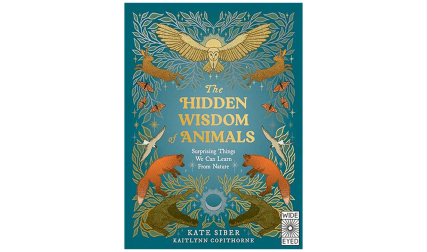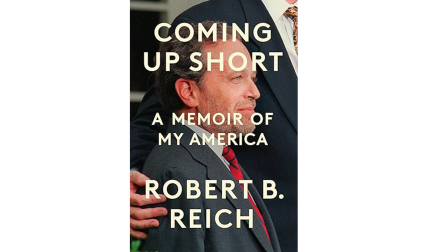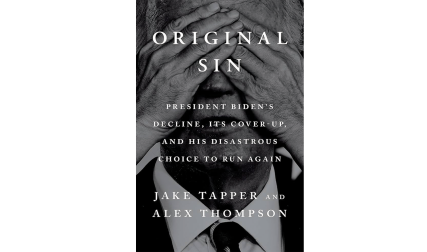William McDonough ’73
Eco-Visionary
A decade ago architect McDonough and German chemist Michael Braungart coauthored Cradle to Cradle: Remaking the Way We Make Things, a manifesto for a new industrial revolution in which materials are circulated indefinitely without damage to the environment or humans. They take the concept to the next level with The Upcycle, which applies design solutions to global environmental challenges such as food scarcity, clean water and climate change. “In his optimistic new book, he and Braungart see nearly endless possibilities for how forward-thinking design and cutting-edge technology can steadily improve products and solve today’s problems,” according to USA Today.
McDonough draws examples from his own work as founding principal of William McDonough + Partners. Recent projects include rooftops covered with soil and native plants that serve as natural insulation, a new NASA facility in California designed to use only renewable energy, and an overhaul of Ford’s Dearborn factory that prevents toxic stormwater from entering the nearby Rouge River. The book itself is a demonstration of the practice of upcycling: The author claims you can even eat it. “The book is so safe you could boil it and serve it for porridge,” McDonough told Vermont Public Radio in August during a visit to Dartmouth. He worked with McMillian Publishers to assess inks, paper and the manufacturing process to produce the edible book. “[So] the largest printer in America now knows how to make a biological nutrient book instead of a toxic magazine,” he says.
McDonough is a well-connected heavy hitter in environmental thinking. Timemagazine named him a “Hero for the Planet” in 1999. He consulted on the Make It Right program, the nonprofit formed by actor Brad Pitt to bring new homes to the Lower Ninth Ward in post-Katrina New Orleans. He has convinced clients ranging from NASA to Walmart that implementing cradle-to-cradle principles is not only responsible citizenship, it’s profitable. In The Upcycle he makes the case that businesses can save money while improving their surroundings—such as with buildings that can capture more solar power than they use so the surplus goes into the grid.
“To us, upcycling is the most exciting project of all,” writes McDonough. “It’s going to take all of us. It’s going to take forever. And that’s the point.”
David Picker ’53
Musts, Maybes, and Nevers
Movie executive Picker offers a glimpse into more than four decades worth of films and characters in his new memoir. “Back when studios were run by filmmakers not corporations, David Picker ran United Artists, Paramount, Columbia, Lorimar,” according to the New York Post. “It’s a great read.”
Paul Parsons ’75
Baden-Powell’s Beads: London
The Tennessee-based orthopedic surgeon just published book two of a four-part fictional series based on an actual strand of Zulu beads. The adventure series weaves fact and fiction in “a well-executed mix of Indiana Jones-style adventure and political thriller,” says Kirkus Reviews.
Robert Sullivan ’75
A Child’s Christmas in New England
Sullivan, the Life Books managing editor, and illustrator Glenn Wolff return to their favorite subject with a Yuletide feast full of memories of childhood celebrations from the 1950s and 1960s. This follows their earlier book, Flight of the Reindeer, which Publishers Weekly called a “charming new Christmas classic.”
Barbara Krauthamer ’89
Black Slaves, Indian Masters
UMass Amherst history professor Krauthamer revisits the history of Southern slavery to reveal the roles of Native American slaveholders. This follows the publication of Envisioning Emancipation: Black Americans and the End of Slavery (Temple University Press), an album’s worth of photographs Krauthamer analyzes to demonstrate the emancipation process.
Andrew Goldstein ’05
Ten Ways to Rescue Your Soul
UCLA molecular biologist—and former professional lacrosse goalie—coauthor Goldstein traces his path through science and logic to spirituality in this personal guide. Goldstein, who ESPN named “the most accomplished male, team-sport athlete in North America to be openly gay during his playing career,” was recently inducted into the National Gay & Lesbian Sports Hall of Fame.
Additional books that were not listed in our print version:
David Levine ’54, M.D., an emeritus professor of clinical orthopedic surgery at Weill Cornell Medical College and director of the archives of the Hospital for Special Surgery in New York City, chronicles the 150-year history of the nation’s oldest hospital for orthopedics in Anatomy of a Hospital: Hospital for Special Surgery 1863-2013 (Print Mattes).
John Hobbie ’57, a founding researcher of the Toolik Field Station in Alaska and a senior scholar at the ecosystems center at the Marine Biological Laboratory in Woods Hole, Massachusetts, offers a comprehensive guide to the only arctic tundra in the United States in Land of Extremes: A Natural History of the Arctic North Slope of Alaska (University of Alaska Press).
Psychiatrist Bruce Forester ’61 offers the second installment in a 14-part mystery series featuring Mort and Millie—a humorous, clever couple who are constantly fighting their own demons—in When a Stranger Knocks(AuthorHouse).
David Laing ’62, a retired park ranger naturalist and geologist, tells a story of two boys—including the son of a Dartmouth classics professor—who fall in love and the conflicts that follow in Eustacia’s Secret: A Love Story (Amazon Digital Services).
Dave deCalesta ’64, writing as David Caradoc, follows the reawakening of long-buried feelings and grudges through a series of reconnections with old high school friends in Reunited, the fourth volume in his “Reunions” pentalogy (CreateSpace).
Former music broadcaster and critic Mark Woodward ’72 follows the investigations of a musical detective as he attempts to explain the mysterious disappearance of all traces of a long dead composer in Xylophone Fragments(Untreed Reads).
Dan Katzir ’86, a senior adviser to the public education nonprofit the Eli and Edythe Broad Foundation, edits a collection of 12 cases on urban school governance developed specifically for training school boards and district leaders in The Redesign of Urban School Systems: Case Studies in District Governance(Harvard Education Press).
Writer and NPR essayist Deborah Prum, Adv’82, follows 15-year-old Cuss and the troubles that hound him in the young adult novel, Fatty in the Back Seat(Still Mountain Bookworks).
Florida International University anthropology professor Juliet Erazo ’92 explores how collective titling—in this case how Native peoples gain land titles as collective organizations—produces new expectations and obligations inGoverning Indigenous Territories: Enacting Sovereignty in the Ecuadorian Amazon (Duke University Press).




